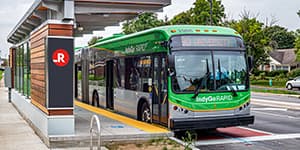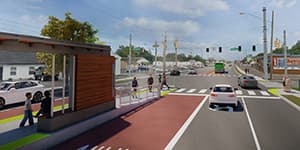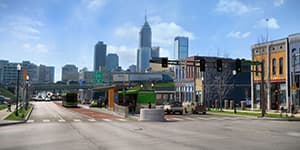Beyond ADA Policy
Outreach Summary
From March 2021 to September 15, 2021, IndyGo conducted outreach as part of the Beyond ADA project. A summary of the outreach efforts can be found in the following documents. A video outlining the draft policy is below.
To view the report of the conducted outreach for the Beyond ADA policy, view memo 1 and memo 2.
Board-Approved Beyond ADA Policy
On September 23, 2021, the IPTC Board of Directors reviewed, considered and adopted the Beyond ADA policies. A summary of the changes at the time of adoption:
- Beginning January 1, 2023, IndyGo will have two service areas – ADA and Beyond ADA (premium service).
- Individuals who become eligible clients following January 1, 2023, and have trips that begin or end in the Beyond the ADA area will be subject to the new policies.
- Trips that begin or end outside the ADA will have a fare of $7.00 per one-way trip.
- Hours from the service will deviate from existing hours.
- There will be no trip prioritization.
For more details, please review the Beyond ADA policy above. If you have additional questions, please contact IndyGo’s Customer Care Center.
See What Service Area You Are In
The Beyond ADA draft policy proposed a premium service for the area outside of the zone mandated by ADA. Trips to, from or within the area outside of the ADA zone are eligible for the new premium service.
Do you live or travel outside the mandated ADA service area? Enter an address on the map. If the address is within the blue, it is within the ADA mandated paratransit service area for our current route network. The area outside of the blue represents where IndyGo is seeking input on how to operate paratransit service in the future.
Disclaimer: This map tool is for planning purposes. The actual determination of whether an address is in or out of the ADA boundary line is determined by IndyGo Access.
Value Statement
IndyGo will continue to connect our community to economic and cultural opportunities through safe, reliable and accessible mobility experiences. Marion County is more than 400 square miles creating some challenges meeting our customers’ needs and the growing demand for reliable service. While change can be difficult, we understand our current service structure is not sustainable. Therefore, our mission moving forward is to continue to thoughtfully present a plan that will allow for a service that meets the ADA requirements while also providing a premium service that can better serve our customers. Reliable, convenient and enhanced rider experience, Beyond ADA.
From the Preliminary Existing Conditions Summary: Task 1 Report:
The American with Disabilities Act is federal civil rights legislation, providing a framework for ending discrimination against people with disabilities. Title II of the Act addresses public services, with a primary goal of providing public services in the most integrated manner. For public transportation agencies, this requires the provision and operation of a fully accessible fixed route system.
The ADA, however, recognized that some individuals with disabilities would not be able to use fixed routes despite accessibility features, thus paratransit complementary to fixed route service is required. Notably, the regulations specifically recognize that ADA paratransit was never intended to be a comprehensive system of transportation to serve all the travel needs of people with disabilities.
To meet the complementary requirements so that ADA paratransit is comparable to fixed route, paratransit must meet six service criteria:
- Operate in the same service area as the fixed route system, defined as a three-fourths–mile corridor on either side of bus routes and around rail stations.
- Have a comparable response time as the fixed routes, defined as accommodating trip requests for a particular day during normal business hours on the previous day (i.e., next-day service).
- Have comparable fares as fixed routes, defined as fares that are no more than twice the base, non-discounted adult fare for fixed route service.
- Meet requests for any trip purpose, meaning there can be no trip purpose restrictions or priorities.
- Operate during the same days and hours as the fixed route service.
- Operate without capacity constraints, meaning no waiting lists, trip caps, or patterns and practices of a substantial number of trip denials, untimely pick-ups or excessively long trips. This criteria has been the more difficult one for transit agencies to meet: transit agencies cannot deny trips for eligible riders and must ensure high levels of performance for ADA trips, including high standards for on-time performance, trip length (measured by travel time) and telephone availability for trip reservations.
In 2018, IndyGo’s contractor-operated, complementary ADA paratransit service experienced a significant performance drop, which resulted in customer complaints and media attention. The significant performance issues, coupled with the gap between the last time IndyGo evaluated its service, led the (then) IndyGo Board of Directors to commission a comprehensive study of its complementary ADA paratransit service, branded Open Door. The study, dubbed the Paratransit Operational Analysis (POA), was led by the KFH Group of Bethesda, MD, with assistance from the Palo Consulting Group and The McCormick Group. Beginning in May 2019, the POA examined ADA paratransit in Indianapolis through a series of tasks. The POA solicited input from Mobility Advisory Committee (MAC) members, agencies who provide services to individuals with disabilities, key stakeholders, and riders (through a rider survey). The study also involved a detailed dive into Open Door operations and performance data. A steering committee was established and included members of the MAC and the IndyGo Board of Directors. The POA Steering Committee provided valuable feedback to the project team throughout the study process.
The final report for the POA includes a set of recommendations for ADA paratransit in Indianapolis, including the next-day service area. The POA recommends IndyGo consider transitioning away from its practice of applying ADA requirements beyond the three-fourths mile around fixed routes. The decision to revisit providing ADA-level paratransit service countywide is based on several factors. First, strict adherence to service requirements in non-ADA areas was shown to negatively impact performance; although a locality can provide premium service levels, that offering should not negatively affect performance in the required ADA area. Second, the ways in which IndyGo delivers paratransit service today, both in terms of the geography covered and the hours served, go beyond being simply complementary to IndyGo’s fixed-route service. Third, strict adherence to ADA-level paratransit service in areas beyond the required ADA service area boundary or at times when fixed-route service is not running severely limits IndyGo’s ability to make service changes. Fourth, strict adherence to ADA-level paratransit service in areas beyond the required ADA service area boundary or at times when fixed-route service is not running further limits IndyGo’s ability to explore cost-saving service delivery options for the Open Door program.
Considering the consultant’s recommendation to transition away from its existing service area policy, but not before seeking significant community input, IndyGo staff is continuing to conduct community outreach and engagement activities regarding its ADA complementary paratransit services. These outreach events will aid in formulating a new set of policies for the Indianapolis Public Transportation Corporation (IPTC) Board of Directors to consider and adopt.
Learn more about the Paratransit Operational Analysis here.
Service Area: The boundary for the Beyond ADA service profile will be the area in Marion County that is outside the required ADA area, defined as three-fourths mile on either side of an IndyGo fixed bus route, as revised from periodically.
Span or Service Hours: Monday through Saturday start times will coincide with the first bus pull out for the day (any route) and end at 10 p.m. On Sunday and observed holidays, the start time will coincide with the first bus pull out for the day (any route) and end at 8 p.m.
Fares: Trips to, from or within the Beyond ADA service area will be charged a premium fare equal to four times the base fare. Currently, that price would be $7.00 ($1.75 x 4). Future increases to the fixed route base fare will result in an increase to this premium fare as well.
Trip Purpose: No trip purpose prioritization
Capacity Constraints: Although IndyGo will make every effort to accommodate all trip requests for the Beyond ADA service profile. IndyGo will exercise its ability to deny trips when capacity to serve the non-ADA area becomes constrained.
Anticipated Adoption Date: Sept. 23, 2021
Effective Date: Jan. 1, 2023
Grandfathering: Current eligible clients will continue to receive the services they receive today at their established address as of Oct. 31, 2022, until one of the following happens (whichever is first):
- Jan. 1, 2025; or
- A client moves from their current residence to a new location within the county; or
- The client loses their ADA eligibility.
Introduction of Same-Day Service: Same-day service on IndyGo vehicles would be implemented as vehicle capacity and schedules allow. The specific policies and procedures for IndyGo’s same-day service will be drafted by IndyGo’s Mobility Solutions staff. The same-day service would be available first to individuals in the non-ADA service area. For this premium service, a higher fare would be charged; the fare for same-day service would be $10.00.
Why are we offering this new service?
IndyGo currently provides ADA-level service countywide, meaning that we maintain the service characteristics required by the American with Disabilities Act (ADA) to the area beyond the required ADA service area, which is only meant to cover areas within three-fourths mile on either side of fixed route and at times when fixed-route service is not running. Recognizing there are in fact two service areas will permit IndyGo to focus on improving its performance in the required ADA area, while offering a new service to the area beyond the ADA.
How was the community involved in the process?
IndyGo offered several opportunities for the public to participate in the development of the draft policy. In-person and virtual meetings were offered during the months of March and April 2021, all of which were in addition to the community engagement efforts that were available throughout 2020. These facilitated, 90-minute meetings provided anyone with an opportunity to influence the design of the new service. IndyGo also hosted individuals from human service agencies, such as Bosma Enterprises, during this same period.
In the hours when service is not available for Beyond ADA service, what options are available to someone who is eligible to ride Open Door?
IndyGo vouchers for its transportation network company (TNC) partners will still allow for travel. Private, nonprofit modes of transportation may also be made available by other agencies.
Why is the proposed fare higher than the fare for Open Door?
Beyond the ADA service is a premium service that is being offered to Indianapolis residents. The higher fare reflects the cost of providing this service, as well as the premium nature of the service.
Why is the proposed fare set at $10.00 for same-day service?
Same-day service is a premium service and something that is not yet offered by IndyGo.
The draft policy states trips in the Beyond the ADA service area may be denied, which is something that cannot happen in the ADA-required service area. What does that mean for eligible paratransit riders?
IndyGo staff will work to ensure few, if any trips, are denied in the Beyond ADA service area. IndyGo may ask for more flexibility from riders when booking trips for Beyond ADA. IndyGo staff will update the denial rate and work to ensure the rate is low.
Will the same-day service be offered for Open Door (e.g., ADA service area)?
Currently, there is no plan to offer same-day service for Open Door clients. There are rules and regulations that dictate the level of service that must be provided to clients traveling within the required ADA service area. IndyGo staff will monitor the same-day service offering in the Beyond ADA area to gain a better understanding of how same-day service might be able to be incorporated as a premium service for its Open Door service.
IndyGo accommodates all reasonable requests for access to large print, Braille and other special services for non-English speakers or people with disabilities. If any special modifications or accommodations are needed, please let an IndyGo staff member know in advance by calling the Customer Care Center at 317.635.3344, filling out the online comment form, or by speaking to an IndyGo staff member in person. Please allow for a 10 business day turnaround on printed pieces.






